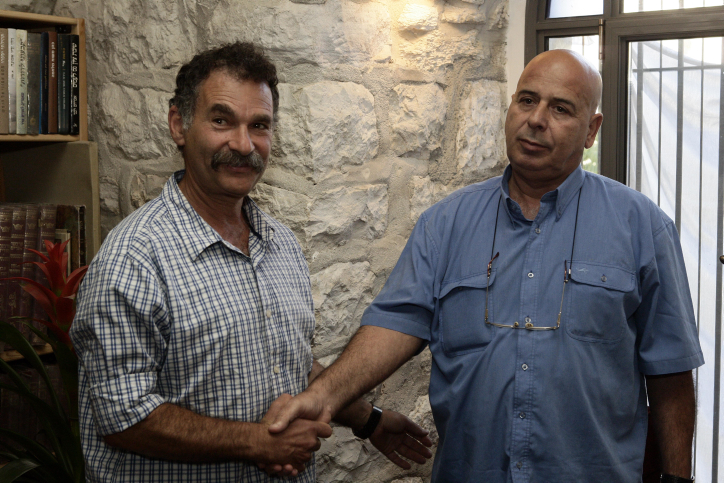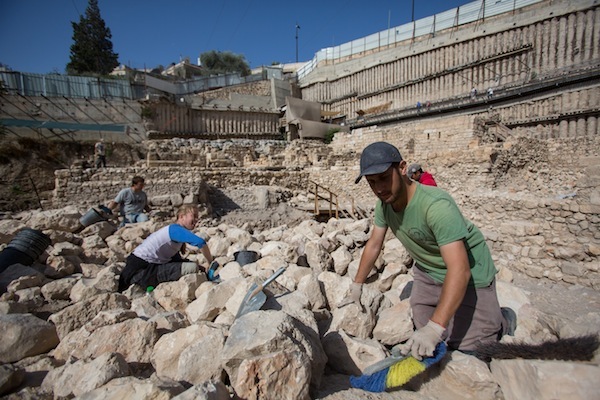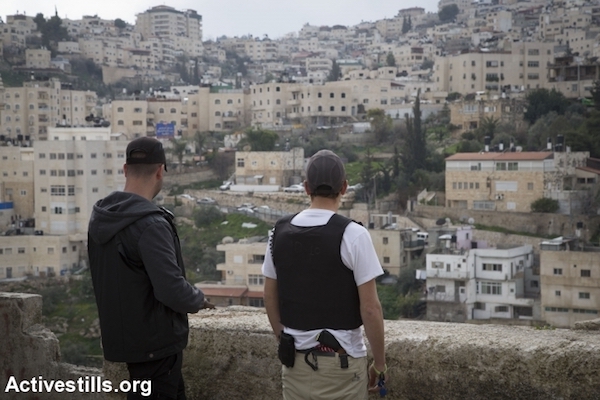David Be’eri won the state’s highest award for doing what decades ago would have seemed impossible: inspiring the Israeli people to identify with the settler enterprise.
By Yonathan Mizrachi

Following last week’s announcement that David Be’eri, the founder of the settler organization Elad, had won the Israel Prize for lifetime achievement, some who closely monitor Israel’s settlement enterprise wondered why a person whose activity is limited to a single neighborhood in East Jerusalem was selected? Why not, say, Ze’ev Hever (Zambish), the figure most closely identified with the settler movement, whose work encompasses the entire West Bank?
Be’eri, whose mission in life is to Judaize East Jerusalem, could not have won the Israel Prize for establishing a settlement of 500 Jews in the heart of Silwan, a Palestinian village numbering 40,000 residents. Although the impact of the settlement, which is scattered throughout Silwan, is undeniable, Be’eri won the Israel Prize for something far more substantial: inspiring the Israeli people to identify with the settler enterprise, an unthinkable task when he first began 30 years ago.
Be’eri understood what any marketing expert knows: that in order to sell, you have to appeal to emotion. Today, many visitors to the City of David archeological site in Silwan truly feel that this is “where it all began,” as per Elad’s slogan. Be’eri and Elad may as well write a patent for identifying the tremendous latent potential in archaeology as a means to advance the settler enterprise.
By the mid-1990s, Be’eri and co. had understood that they were sitting on a gold mine that could bring about remarkable political change. In order to create this change, the foundation joined forces with the Israel Antiquities Authority (IAA) and the Israel Nature and Parks Authority (INPA). While the latter transferred to Elad the rights to manage the City of David, the IAA became an excavations contractor, whose work at the archeological site reached unprecedented levels, especially considering that fact that we are talking about a relatively small area — 25 acres in the village of Silwan.

The positioning of City of David as the bedrock of Israeli identity rests on two central achievements: presenting the site as the capital of King David, the Biblical founding father of the Jewish nation, and the branding of the Roman street as a historical “pilgrim’s route” to the Second Temple. Thus, the City of David has taken on mythical dimensions in Israeli consciousness, and in complete disproportion to the fact that the area in question is little more than an archaeological mound with remains in various degrees of degradation.
Those who tour the site with an Elad guide are treated to an emotional, even spiritual experience, where religious texts and traditions shed light on the antiquities creating a 3D time tunnel that seals itself into the consciousness of every Israeli is recreated. Meanwhile disputes between archaeologists over the dating and significance of the finds remain inside the ivory tower (archaeology isn’t an exact science, and based on the little that has been published in academic journals, there is disagreement among archaeologists over the dating of some of the findings and their past uses. The most familiar debate is whether certain findings are the remains of King David’s palace. This is a complex discussion that defies populist slogans).
The Israel Antiquities Authority plays a decisive role in transforming City of David into a site that stirs feelings in over 300,000 Israelis and tourists each year. The IAA is the government body that Be’eri is most indebted to for his Israel Prize win, since they agreed to excavate almost every free space in Silwan in order to expand and strengthen City of David National Park.

At first the Elad-funded fencing and excavations involved mostly public areas (for example, the village spring). Later the Israel Antiquities Authority was recruited for the two biggest excavation enterprises in Jerusalem: the Givati Parking Lot excavations, across from the Old City walls, and the advancement of the construction plan for a giant visitor’s center; and the digging of tunnels 600 meters in length, from the Siloam Pool to the Western Wall area. In order to facilitate the extraordinary enterprise of transforming Silwan into the City of David, the Israel Antiquities Authority agreed to dig beneath a residential area using a method of excavation that has been criticized even within the IAA itself. The consent by various archaeologists, from both outside and within the IAA, for these kinds of excavations is what made that transformation possible in the first place.
Thus, while many criticize the settlements throughout the West Bank — mostly places they have never visited — when it comes to the archaeological settlement of City of David, Be’eri has won support across the board. Dressed up in the respectable guise of archaeology, Be’eri and his colleagues succeeded in concealing from many intelligent people the fact that City of David is situated in the heart of one of the most densely populated Palestinian villages in East Jerusalem — arguably in the most sensitive point in the city. Thanks to archaeology, Be’eri is free to continue Judaizing an area key to any political solution for Jerusalem.
Today, after over two decades of settlement in Silwan, David Be’eri and the Elad foundation stand at the center of the Israeli consensus. Their ability to deceive both the public and politicians into thinking that this is where the Jewish nation was founded is the reason for Be’eri’s win. The powerful emotional experience that accompanies a visit to the City of David is the key factor underlying Elad’s success in changing the geopolitical reality of Jerusalem (and that of the entire conflict).
Now we are seeing an entire generation of Be’eri followers in the West Bank: in Shiloh, Susya, and Hebron, to name a few. The Israeli Left, on the other hand, is failing perhaps because unlike Be’eri and his disciples, they have not found a way to speak directly to the heart of Israeli Jewish identity. Perhaps that is why Be’eri has won he Israel Prize this year, while the organizations on the left are fighting for their right to exist.
Yonathan Mizrachi is an archaeologist and CEO of Emek Shaveh organization. This article was first published in Hebrew on Local Call. Read it here.
